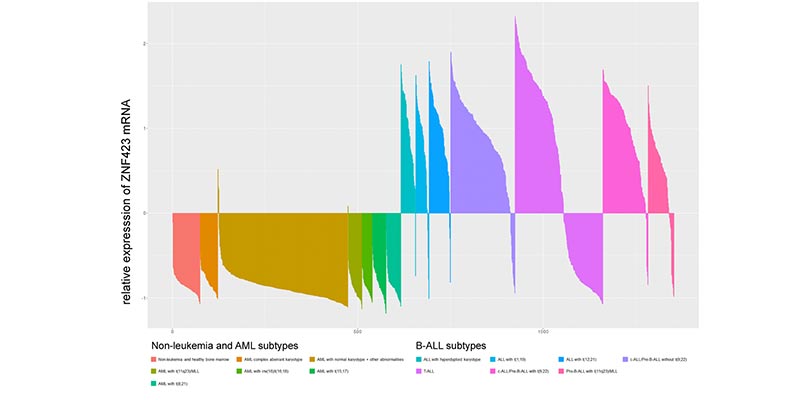
ZNF423 - the underrated player in leukemogenesis?
Despite the critical importance of the early B-cell factor 1 (EBF1) in the development of B-cells, the frequency of mutations found in acute lymphoblastic leukemias affecting this factor only represent less than 5%. Related to this, we have previously reported that the aberrant expression of the EBF1-antagonist ZNF423 is implicated in B-cell leukemogenesis, but the underlying molecular mechanism has not been comprehensively described. In this study, we have analyzed the presence of ZNF423 on large data sets of primary acute leukemia samples. These analyses revealed a widespread presence of ZNF423 in various subtypes of acute lymphoblastic leukemia (ALL), while it was completely absent in other types of leukemia like acute myeloid leukemias (AML). This interesting finding led us to develop a cellular model of pro-B leukemia by using CRISPR-Cas9–technology to disrupt the expression of ZNF423. Using this model, we observed that the disruption of ZNF423 decreased cell viability and also prolonged the survival of mice xenotransplanted with cells lacking ZNF423. To complement these data, we not only mapped for the first time the genome-wide binding pattern of ZNF423 but also investigated the different epigenetic marks of the genome regions attached by ZNF423 and their corresponding transcriptomes. Thereby, we identified the mechanisms by which this protein regulates differential gene activities in a B-lineage context. In addition, we characterized the role of ZNF423 in integrating the transcriptional programs of EBF1 and SMAD co-factors. Among a variety of biological functions, SMAD proteins are in charge of propagating developmental and growth signals of critical importance for cells. Exemplarily, we show how ZNF423 offsets EBF1 in regulating the SMAD-regulated gene TGFB1, which is essential for the normal development of hematopoiesis.
In summary, we show that the net effect of ZNF423 action leads to a significant attenuation of EBF1-dependent transcription on a genome-wide scale. Given its wide prevalence and impact on various subtypes of acute lymphoblastic leukemias, we believe that ZNF423 might play a hitherto underestimated role in leukemogenesis.


















